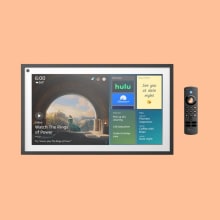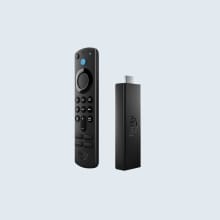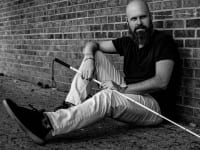Disability advocate Molly Burke talks accessible products for the blind community
Is Alexa the secret to making your home smart and accessible?
 Credit:
Reviewed / Molly Burke
Credit:
Reviewed / Molly Burke
Products are chosen independently by our editors. Purchases made through our links may earn us a commission.
Anyone with a passing interest in technology has some knowledge of the advantages of smart home devices. For many, they allow us to talk to Alexa, Google, or Siri to easily toggle lights and perform basic residential tasks. For those in the blind-and-low-vision community, like popular beauty/style influencer Molly Burke, they’re a lifeline to interaction in a touchscreen-obsessed world full of benefits and challenges.
Burke has been a fixture in the disability community for several years, with millions of subscribers across social media platforms. Since becoming legally blind at the age of 14, the 29-year-old content creator has used her platform to highlight the advantages of accessible products.
Follow along throughout Accessibility April to hear more about the incredible accessible products changing people’s lives.
How smart home helps others in providing accessibility
“Smart home products: The average person views them as a great thing to use on a lazy day, when you don't want to get off the couch to close your blinds, when you're going to bed or whatever,” Burke describes, “but for disabled people, I really believe that smart home products can take you from not being able to do something independently to fully being able to do something independently. And I think that is truly incredible.”
Burke, a skilled entrepreneur in her own right, recently launched a content partnership with Amazon to show others facing unique challenges how voice- and touch-controlled lights, speakers, and appliances can be a game changer. Despite working with major brands like Google, Samsung, and Microsoft in the past, Burke identifies with Alexa as a voice assistant because of its focus on blending fun with functionality.
“I've tried a lot of different smart home [products], and I really love Alexa,” Burke says. “I think Alexa has a personality. I know that sounds maybe silly, but I lay in bed and play games with Alexa, or like trivia, or you can ask her to play a barbershop quartet and it sings to you about technology. It's so fabulous. I like to have fun in life, so I love that element to it.”
The greater service of smart devices

The Echo Show 15 receives voice commands and functions with a screen-reader-friendly touchscreen.
In late 2022, Burke finally moved into a new condo after a lengthy renovation process designed to ensure everything in her space was expertly tailored to her needs. As it turns out, smart home tech was a major part of that picture.
Burke has the Echo Show 15 installed in her kitchen, and that serves as the hub of the house. It features a built-in screen reader when interacting via touch, but it’s also available to receive voice commands at the ready. This means everything from her smart blinds, to her air fryer, slow cooker, doorbell, oven, and lights can all be managed in one central location.
“The Echo Show 15 [occupies] my favorite space in the home,” Burke says. “Because all of these things that I've always been so scared of doing, I now feel like I can start to learn in a space that's going to allow me to thrive.”

Available to receive voice commands at the ready, the Amazon Echo Show 15 offers a big, beautiful screen and the usual Alexa smarts.
True to Burke’s fun-loving but practical nature, finding the right smart products for her home meant striking a balance between satisfying basic needs while ultimately ensuring she can enjoy herself in her home. For security purposes, she loves the Ring Video Doorbell, which allows her to communicate with new arrivals whether she’s home or not. When it’s time to relax, she’s amazed by the newfound flexibility of the 4K Fire TV Stick.

A huge benefit of the Fire Stick is the device's integration of Alexa and voice commands, helping users discover their favorite media without having to touch the remote.
“With the Fire TV Stick, I was so excited to show my mom and dad that I could pick my own TV show,” Burke says. “Before that, if I wanted to watch something on the TV in the living room, I would have to have somebody help me. If I wanted to do it independently, I would watch it on my computer. And so being able to use a combination of Voice View, which is the built-in screen reader, and Alexa to navigate through apps is so exciting for me.
“And it's something that's so simple, and it's so basic. Sighted people sit down every single day and they do that. If you have dexterity issues and you can't control a remote control, you might have never had that opportunity, and now you can control it with Alexa and your voice. I appreciate when companies prioritize the simple things that bring joy and not just the utilitarian aspect of being able to allow disabled people to function. Because there's so much more to life than just functioning.”

The Fire Stick supports popular streaming services and integrates Alexa and voice commands for a smooth, accessible experience.
For those just getting their feet wet in the world of smart home tech, the content creator suggests starting simple. “I like the lighting, like the smart plugs. I think it's just kind of nice to be lying in bed and have your lights turn off. That's a really inexpensive simple one to start with,” she advises.
For those eager to tackle a new adventure, Burke is also an advocate of cooking devices that can be controlled via voice or the embedded screen reader found in smartphones. “If you're into cooking, getting the Alexa-compatible slow cooker and air fryer are really great, I feel like the disability community has single handedly made air fryers thrive because we all just love air frying stuff so much,” Burke says with a laugh. “It's such a great accessible tool for cooking, so getting the Alexa-compatible one just makes it even better.”
Having grown comfortable with the air frying basics, Burke will soon be making more use of her smart cooktop from Bosch. While she’s happy with her purchase, finding the right product in that category proved to be a serious challenge.
“One thing that I was noticing when I was shopping for appliances that was extremely disheartening to me is that like, with a lot of tech, we're moving towards pretty much all touchscreens, which inherently is not accessible to many people, but especially the blind community,” Burke explains. “So they would say, 'oh, well you can use the app.' And then the app wouldn't be screen-reader-friendly. And it was like, well, no, I can't. And so, when I found that Bosch was both Alexa-compatible and had a screen-reader-friendly app, I was really excited. It made the choice very easy for me.”

The Bosch Benchmark Series frameless induction cooktop with Home Connect is Alexa-compatible and has a screen-reader-friendly app.
As is the case with all smart home tech to some degree, Burke cautions that software updates can sometimes unintentionally break accessibility features, but her experience has been positive with the devices she’s tried thus far at the time of publication.
The growth and setbacks of universal design

Smart plugs are an awesome way to start exploring what smart home is all about. It's a breeze to toggle your lights and appliances with the sound of your voice.
As life changing as smart home tech has been for Burke and many others in the disability community, her struggle to find a truly inclusive kitchen appliance highlights both the good and bad of the state of accessibility tech in 2023.
For Burke in particular, her frustration with touchscreens that don’t have screen readers is an ongoing one. “The more and more old-school appliances with buttons and knobs break down, landlords are going to be switching to newer modern appliances, which are seemingly almost all touchscreen,” she laments. “And so it's just going to leave our community with a wider gap instead of bridging it.” And that shortcoming extends to paying for a morning coffee at a touch-based credit card terminal or even going on vacation.
In what she describes as a “nightmare,” Burke was recently disappointed to discover that a cruise line had adopted touchscreen-controlled elevators. “I think [cruises are] a great option for many different types of disabilities, which is why I enjoy them.
“But that particular cruise ship had a touchscreen elevator, and I was like, this is such a step back. And I recognize that most people see that as like, 'Oh my god, this is so cool, what modern technology!' For somebody like myself, it's like oh great...It just shows that disabled people aren't necessarily always being consulted, and actually often aren't being consulted, in the design process,” she says.
To help others combat such hurdles, the well-known accessibility advocate has worked with the world’s biggest brands on a consultant basis. And, through that work, she’s come to understand just how tough it is to spend years working around red tape to bring inclusive products to market. In short, she believes anything can be made accessible, and inclusivity is best achieved through a combination of buy-in from daring brands and the support of disabled and non-disabled believers in accessibility.
At the business level, Burke feels there are lots of companies that simply fail to notice a lucrative market. “I think too many companies forget that disabled people exist,” she says, “and we are a market that you are missing out on if you do not hire inclusively, design inclusively, [and] market inclusively. You are missing out on dollars that have to be spent.”
And, should brands take the leap of faith to be the first to enter an accessible category, Burke feels potential users should manage their expectations to help foster further innovation. “Mistakes happen. Not everything is going to be perfect at first launch,” she explains.
“I think everything is worth celebrating because they tried. They saw that we exist, and they wanted to give it a go. And I feel like being like hey, thank you, thank you for seeing us! Thank you for understanding that we're here. Let's work together to make this next launch even better. Because guess what? Even the first launch of products that we all know and love today weren't good ten years ago when they launched. That's why we're on the 14th iPhone. Because if it was perfect the first time, we'd be done.”
Burke was quick to remind us that that voice-centric Alexa, which helps many disabled people, was able to grow through a similar iterative process. Its earliest incarnations sprung from a desire to build a Kindle for blind users.
As the accessibility industry grows, Burke sees a path forward through well-reasoned support over overwhelming criticism. “I think it's important that the everyday consumer be aware of the lack of accessibility, so that they can shop with intention, and they can support businesses that are supporting the people in the communities that they might love and care about,” she says.
Smart advocacy and spreading the message

Influencer Molly Burke is a major advocate for accessible product design, and she sees smart home in particular as an area with significant growth in recent years.
From this lens, it’s clear Burke sees Amazon as a brand willing to take risks worth supporting for the sake of her community. She feels the Alexa ecosystem provides benefits to not only those in her position, but anyone willing to use it.
“It's awesome being able to just have Alexa turn on and off my lights and open and close my blinds,” she says. “And some of it I'm like, could I do that as a blind person? Yeah. But, like it would be for anybody, it's also nice to just be able to have all of it done for me.”
And its achievements like these that she feels are worthy of celebration at a time when accessibility wins are still few and far between. “We have to remember that, for every one company that tries to release a product that's accessible, there are 100 companies who aren't even trying, who don't care, who aren't seeing us at all,” she explains. “If we want anybody to try, we need to support the ones that are starting first. They've got to walk so the other companies can run. They've got to take the hits, and make the mistakes, in order to show how to develop a good product.”
As a prominent voice in a niche population, Burke intends to keep leveraging the reach of trusted brands to spread her message of inclusion. Taking cue from Thando Hopa, a South African model and lawyer with albinism, she aims to redirect any potential fear of tokenism she faces to help further her goal of assisting and highlighting the needs of the disability community.
“You know what? If you want to use me, I'm going to use you back,” she says. “I'm going to use this as an opportunity to share my message and to speak about my truth. And so, whether it's tokenism or it's authentic, either way, the message is getting out there. And eventually it will no longer be tokenism. Eventually, it'll all just be authentic marketing and inclusion of disabled people.”


